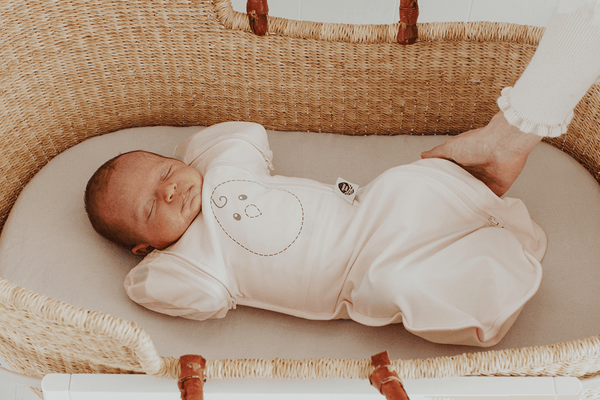Shopping Cart

There's nothing more exciting as a new parent than watching your baby discover the world and their own skills through fresh eyes. But while reaching a new developmental leap during each of your baby's 'Wonder Weeks' is an exciting moment for most babies and parents, it can wreak havoc on your baby's sleep patterns as they begin to have more of an understanding of the big world around them.
In this blog, we'll give you the rundown on helping your baby with falling asleep independently even through these moments in development that may be keeping them awake. From soothing sleepwear and bedrooms to consistent bedtime routines, there are plenty of steps you can take to ensure that these few nights every few weeks aren't totally sleep deprived!
What are the mental leaps?

The "Wonder Weeks" refers to a set of phases or leaps in which babies experience significant mental development, taking place over the first 20 weeks of their lives.
The term was first introduced in the 1992 book titled The Wonder Weeks: How to Stimulate Your Baby's Mental Development and Help Him Turn His 10 Predictable, Great, Fussy Phases into Magical Leaps Forward by the Dutch authors Frans Plooij, and Hetty van de Rijt. Though the weeks are numbered, they are more of a set of guidelines, often different for each baby.
There are a total of 10 mental leaps that were identified by Plooij and van de Rijt, during each of which your baby will gain more and more skills, and a greater understanding of the world around them. However, the mental developments they go through can also result in them becoming more fussy at times, all the while causing difficulty sleeping reminiscent of sleep regressions.
These are the leaps they identified, as well as the weeks around which they occur:
-
Weeks 4: Changing Sensations - your baby's understanding of the outside world will increase
-
Week 7: Patterns - they will begin to recognize and respond to patterns and routines in their environment such as feeding and sleep patterns
-
Week 11: Smooth Transitions - their senses will mature and improve, and they will have smoother transitions between states, for example, awake and asleep
-
Week 14: Events - your baby will begin to understand cause-and-effect relationships, and may start to predict and anticipate events
-
Week 22: Relationships - your baby's social awareness will increase as will their ability to recognize familiar faces
-
Week 33: Categories - they will start to be able to mentally categorize objects and experiences based on similarities and differences
-
Week 41: Sequences - they will gain a deeper understanding of sequences and patterns of events and routines
-
Week 51: Programs - they will begin to see sequences as whole programs that accomplish certain results
-
Week 59: Principles - your baby will start to understand the principles of the world, being able to think and plan ahead as they understand which actions result in what
-
Week 70: Systems - they will develop further understanding of the systems of the world as they act upon knowledge of principles, become more self-aware, and start to appreciate things like time
As you can see, the Wonder Weeks (also accessible through the Wonder Weeks app) and the mental leaps that come with them are full of exciting new developmental milestones for your baby, all of which can affect their mood, and their sleep, in different ways. Don't worry though, as there are many things you can do to help them sleep as they make these leaps!
Helping your baby sleep through leaps

As your baby leaps through the Wonder Weeks, they are constantly gaining awareness of the world around them, which can be quite a mental load to take on. They will also become more and more perceptive and sensitive to stimuli, which compounds with their newfound awareness, resulting in them having difficulties settling down to sleep, and staying asleep once out.
The Wonder Weeks, as a concept, can be very helpful in terms of giving you an idea of what to expect as your baby develops throughout their first 20 months. However, it's important to remember that every baby is different, and there will always be variations of when these leaps happen and how it impacts their unique sleep cycles.
One common point, though, is that at some point throughout the Wonder Weeks, your baby will probably struggle with sleeping through the night as a result of their increased mental development. Though how much sleep your baby gets through the night is also dependent on factors like age and stage of development, leaps can have a massive impact. That's why we're here to give you some tips for how to settle them back into being relaxed, sleepy, and finally, asleep - hopefully for the whole night!
Make their sleep space relaxing

As your baby starts to make their way through the leaps, they will gain an increasingly high level of awareness of the world around them, as well as become much more sensitive to external stimulation, whether that's from sights, sounds, or anything. The world, and all the stimuli that come with it, can be very disruptive for a baby who is trying to get to sleep!
You can work against all the disruptive stimuli of the world by ensuring that your little one's sleep space and environment are nice and relaxing during sleep periods. Dimming the lights, and making sure to reduce noise as much as possible are both great ways to reduce disruptions to your baby's sleep and help them settle down when it's bedtime as well as when baby wakes through the night.
Establish a consistent bedtime
At various points throughout the leaps, your baby will gain a greater awareness and appreciation of patterns, events, and sequences, before eventually viewing these sequences as whole programs that allow them to better understand the principles and systems of the world. As such, the consistency and predictability of routines will start to bring them a lot of security and comfort, which also stands them in good stead for any sleep training method you choose.
Establishing a consistent bedtime is the perfect way to take advantage of their appreciation of routines in a way that helps babies sleep. Making sure your little one goes to bed at a consistent time every night will help them begin to anticipate and prepare to settle down for bed comfortably and calmly, easing them into what will inevitably be a much more successful night sleep, while helping develop healthy sleep habits in the future.
Engage with their new skills

Engaging with your baby's new skills helps them feel more fulfilled and less likely to stay up during the night testing out what they're learning. This leads to them finding it easier to settle down and fall asleep, similar to how you might find it easier to get to sleep at night knowing you've completed everything you had to do during the day!
During the leaps, your baby will begin to more confidently explore their environment, become more social, and their cognitive abilities, such as their memory, will improve. Giving them slightly different environments to explore, partaking in responsible social interactions, and introducing more toys and games to them are all great ways of engaging with their new skills, which can leave them feeling fulfilled and calm.
Create a calming routine
From fairly early on in the Wonder Weeks mental leaps, your baby will start picking up on patterns in their environment as they get more aware of the world around them. They will soon start predicting and anticipating events, which will snowball into an understanding of sequences before they finally view sequences of events as whole programs, and start using and changing these programs to develop an understanding of the principles and finally systems of the world.
What this essentially means is that they become increasingly sensitive to routines. Consistent routines are amazing for babies as they promote feelings of security and comfort, as they do in us. We're huge supporters of bedtime routines, as the comfort and reliability they bring to a baby's life are perfect for helping them understand when it's time to begin to wind down and go to sleep.
Dress them in soothing sleepwear

Sleepwear can make a vital difference when it comes to helping your baby get to sleep. During the leaps, babies can get very fussy, irritable, and clingy, all of which makes it hard for them to settle down to sleep on their own. The right sleepwear can provide a good level of comfort and support which can soothe their irritation, and work against separation anxiety, helping them calm right down ready for bed.
Our range of Zen Sleepwear consists of swaddles, sleep sacks, footies, and bodysuits, all of which are designed for little ones of various ages - many of which occur during the Wonder Weeks. They're all gently weighted with Cuddle Pads™ to mimic your soothing touch, helping them settle down despite everything going on in their heads during this period of their lives. For instance, our Zen Neo swaddle pod could be perfect for babies needing womb-like comfort in Leap 1, while our Zen Sack Classic is a great option to soothe babies in later leaps like 5 and 6.
Mental leaps: what to remember
The mental leaps your little one will go through as they progress through the Wonder Weeks can be very fun and exciting to witness, but they can also make them stressed out, more likely to kick up a fuss, and increase their feelings of separation anxiety as a result of being more aware of the world around them, and more sensitive to stimulation. All of this can have a detrimental effect on how well they can get to sleep and remain that way.
Luckily, there are lots of things you can do to gently help them out when it comes to settling down and drifting off to a good night's sleep. Ensuring their sleep environment is nice and calming, establishing a consistent bedtime as well as a bedtime routine, engaging with their newly acquired skills during the day so they feel fulfilled, and dressing them in soothing, supportive sleepwear are all brilliant methods of helping your baby wind down and sleep the night.

